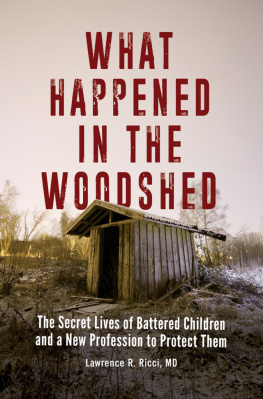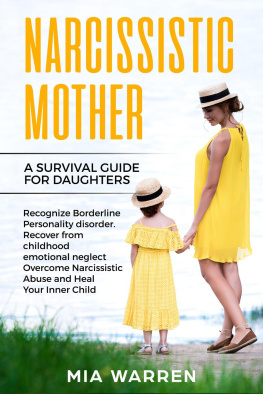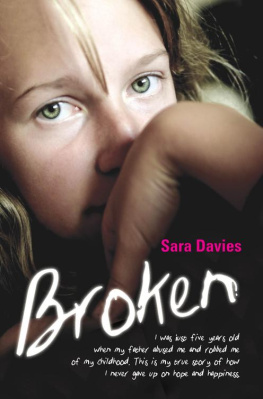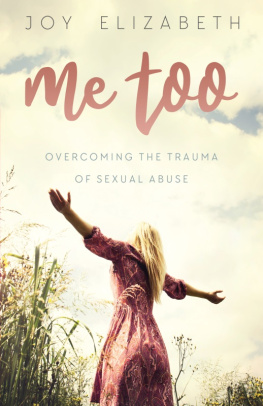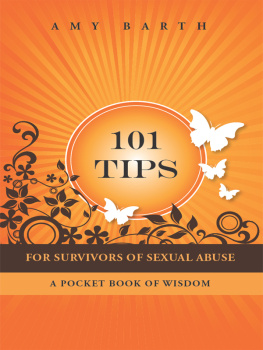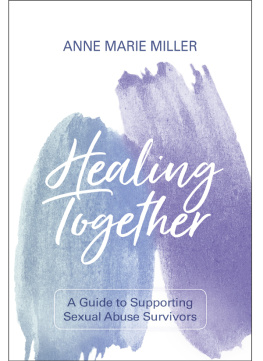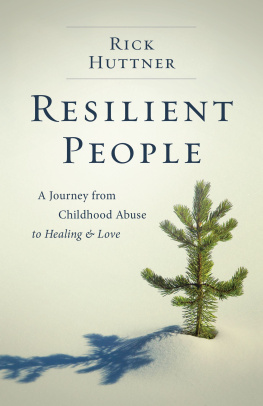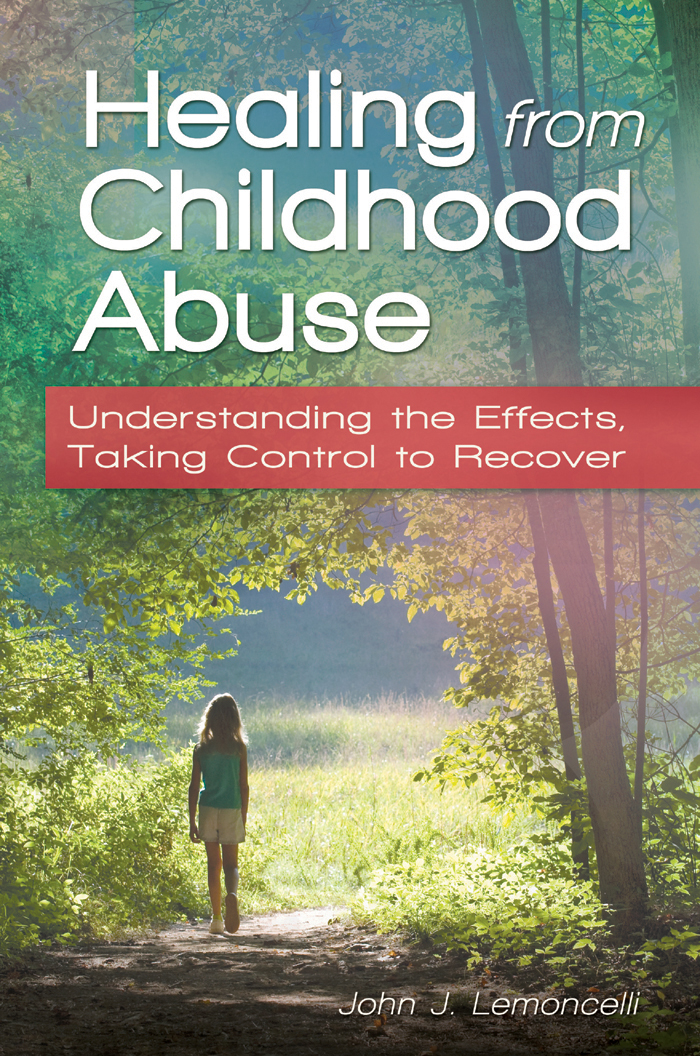John J. Lemoncelli, EdD, is a tenured Professor in the Graduate Psychology and Counseling Department of Marywood University, Scranton, Pennsylvania. He is also the Assistant Chair for the Counseling Program. He maintained a part-time private practice for nearly 30 years where he specialized in the treatment of adult survivors of abuse and clergy. He has written articles and has given numerous presentations on the topics of ethics, spirituality and psychotherapy, and treating adult survivors of abuse. He is licensed by the Commonwealth of Pennsylvania as a Psychologist and is a Licensed Professional Counselor.
Healing from Childhood Abuse
Understanding the Effects, Taking Control to Recover
John J. Lemoncelli, EdD

Library of Congress Cataloging-in-Publication Data
Lemoncelli, John Joseph.
Healing from childhood abuse : understanding the effects, taking control to recover / John J. Lemoncelli ; foreword by Robert S. Shaw.
p. cm.
Includes index.
ISBN 978-0-313-39788-2 (hardback)ISBN 978-0-313-39789-9 (ebook) 1. Adult child abuse victimsRehabilitation. I. Title.
RC569.5.C55L449 2012
616.858223903dc23 2011050347
ISBN: 978-0-313-39788-2
EISBN: 978-0-313-39789-9
16 15 14 13 12 1 2 3 4 5
This book is also available on the World Wide Web as an eBook.
Visit www.abc-clio.com for details.
Praeger
An Imprint of ABC-CLIO, LLC
ABC-CLIO, LLC
130 Cremona Drive, P.O. Box 1911
Santa Barbara, California 93116-1911
This book is printed on acid-free paper 
Manufactured in the United States of America
This book discusses treatments (including types of medication and mental health therapies), diagnostic tests for various symptoms and mental health disorders, and organizations. The author has made every effort to present accurate and up-to-date information. However, the information in this book is not intended to recommend or endorse particular treatments or organizations, or substitute for the care or medical advice of a qualified health professional, or used to alter any medical therapy without a medical doctors advice. Specific situations may require specific therapeutic approaches not included in this book. For those reasons, we recommend that readers follow the advice of qualified health care professionals directly involved in their care. Readers who suspect they may have specific medical problems should consult a physician about any suggestions made in this book.
DEDICATION
To the Great Spirit
who is the true Healer
To my wife, Peggy
my best friend and soul mate
To all my patients
who have taught me so much
To you, the reader
that you may find consolation, hope, and healing
Contents
Foreword
This book is written directly to the individual who has experienced the pain and suffering that result from abuse/trauma. Dr. Lemoncelli reaches out to the individual from his years of experience working with abuse/trauma in a deeply personal way that is undergirded by solid theory, research, and professional practice. The case examples contained in this book bring to life his proposed theory and treatment protocol designed to assist survivors to gain genuine insight into the effects of abuse/trauma. The case examples clearly demonstrate to the reader that they are not alone in their suffering, thereby reducing the isolation that is so common among the survivors of abuse/trauma.
This book is filled with empowering messages of and from survivors as well as the consistent themes of hope, resilience, and encouragement. However, Dr. Lemoncelli skillfully and compassionately identifies the fears and trepidations that one might experience as they journey to recover.
What especially impressed me about this book is that Dr. Lemoncelli takes on the role of a coach and confidant, constantly working to validate and normalize the feelings and emotions that typically result from abuse/trauma. He uses a significant amount of reframing to assist the individual to see strength where he or she saw weakness and to see resilience where once he or she saw chaos and confusion. He is able to take complex psychological issues and present them in a manner where they are readily understood by the surviving victims. The metaphor of the parasite and the parasite model are well grounded in both biology and psychology. The parasite model allows the individual to make a therapeutic distinction between the self and the abuse/trauma, and to come to believe that the abuse/trauma is only a part of the person, not all of the person. Dr. Lemoncelli outlines 14 stages to assist the individual in his or her recovery and yet encourages the survivor to use these stages only as a guide, rather than a recipe for recovery. He constantly reminds the individual to begin to trust the self because the keys to recovery lie inside of the individual despite what he or she and others have told the individual for years, perhaps a lifetime. As a competent professional, the author tells the reader he is making recommendations, not mandates.
While this book is written directly to the individual who suffered abuse/trauma, it is also indirectly written to the caring ones around the survivorcompanions, spouses, friends, and familyto provide them with a solid and dramatic appreciation of the effects of abuse/trauma. Dr. Lemoncelli does this in a manner to assist the caring ones, not to excuse or overlook the self-destructive behaviors of the survivor, but rather to understand the complexity of the effects of abuse/trauma. Equipped with a better understanding of the self-destructive behaviors, the caring ones will be able to directly assist the survivor in the survivors road to recovery. Lemoncelli constantly reminds the survivor that he or she is not responsible for the abuse/trauma with its resulting pain and suffering, but the survivor is responsible to heal the pain and suffering.
Finally, I believe this book is a great benefit, a must read for any clinician working with survivors of abuse/trauma. This book should serve as a text, or at least required reading, for courses designed to teach clinical trainees about the effects of childhood and adolescent abuse/trauma, and how to assist the survivors in their journey of recovering.
Robert S. Shaw, PsyD, ABPP
Director, Counseling/Student Development Center
Marywood University, Scranton, PA
Board Certified, Clinical Psychology
American Board of Professional Psychology
Acknowledgments
Throughout the course of my life, my father, Sam Pop, attempted to teach me many things. One thing he did instill in me is gratitude. One of my favorite quotes from my dad is:
A man comes into this world with many flaws
And leaves this world with even more flaws
One of those flaws need not be ingratitude.
There have been so many people who supported, guided, and encouraged me that it would be impossible to mention all of them individually. So, to those people who are not mentioned individually, especially my patients who had the courage to allow me to tell their story, know how grateful I am. My heartfelt gratitude goes to each and every one of you.
There are some people I need to recognize in a special way.
My daughter, Mauri, who pushed, prodded, supported, and was so honest.


